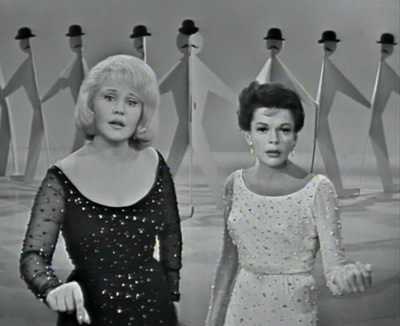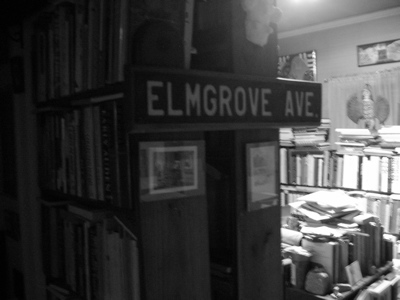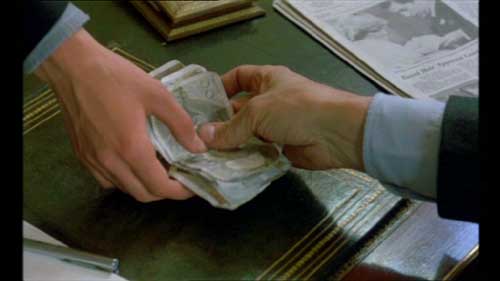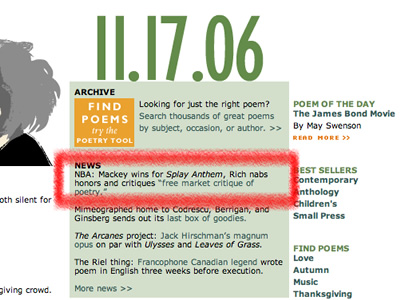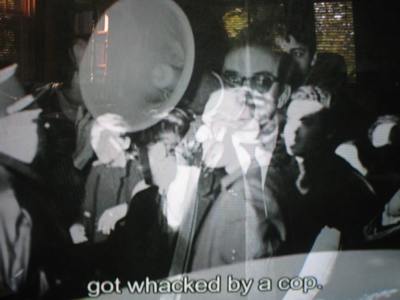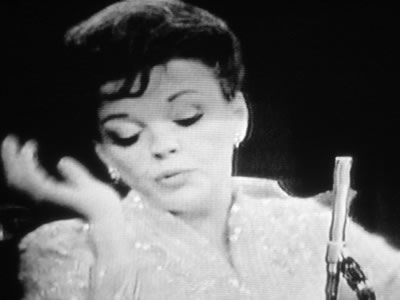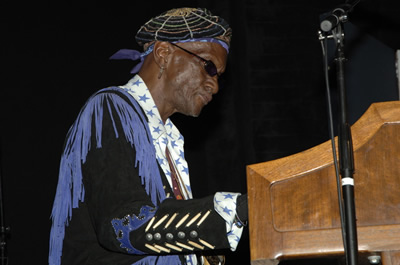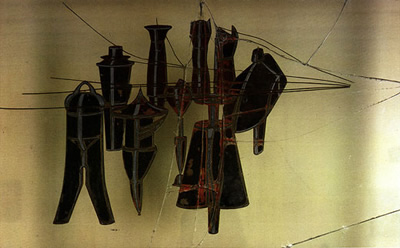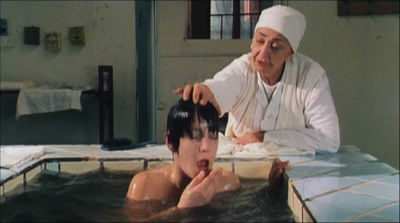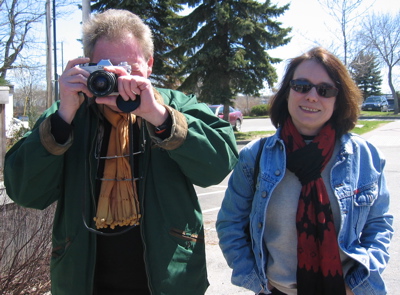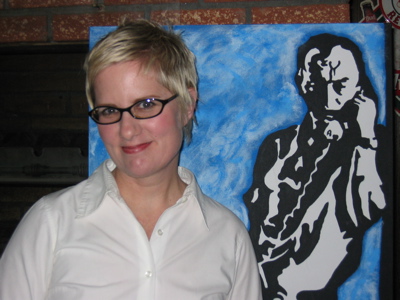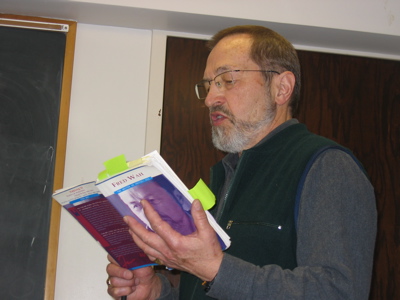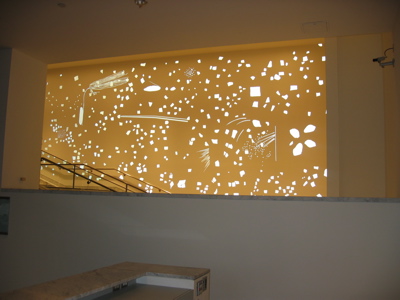"It is very likely that nearly every one has been very nearly certain that something that is interesting is interesting them" — Gertrude Stein
§ From a journal (January 1994) — Kafka never can work: when he might be able to there is something that defeats him—headache, necessity of going to bed before 1 or 2 so that he can get to the office in the morning, a letter from "F." or someone connected to her, perhaps above all, noise. It is an elaborate game that he chronicles in detail. "Once again prodigious efforts stand before me. You have to dive down as it were, and sink more rapidly that that which sinks in advance of you" (January 30, 1915).
§ The Architect Sketch — Saw a dozen or so episodes of early Monty Python last week (freeloading on another person's gift). Hadn't remembered this one, in which Cleese's pacing is brilliant. The frame shift first cued by "rotating blades" takes a few seconds to accomplish, in which lag the humor: "This is a 12-story block combining classical neo-Georgian features with the efficiency of modern techniques. The tenants arrive here and are carried along the corridor on a conveyor belt in extreme comfort, past murals depicting Mediterranean scenes, towards the rotating knives. The last twenty feet of the corridor are heavily soundproofed. The blood pours down these chutes and the mangled flesh slurps into these...." • Upon learning an abattoir was not what the committee had in mind: "Oh. I hadn't fully divined your attitude towards the tenants."
§ Phonomnesis (James Brown) — Circa spring of 1983, an LA club called Lhasa temporarily became the spot we all craved to go to (not a club, now that I think of it, but a night at a club: we never knew for sure if and when it would be happening & guessed wrong at least once—not a small thing since it was an hour's drive away). I remember one night dancing to the Supremes with a bunch of superior mods (mod had no internal check on snobbishness), feeling dejected about some impossible erotic object, and gaping at the screen on which this was projected. • A few years later (when I was a sophomore at college?), I went to a party thrown by UCSD art department grad students at which all they played was James Brown: it seemed the height of considered taste to me. • What I can't recall is when I first heard him: the famous Apollo show recording was released two years before I was born, so in a way, he never wasn't there. • Via Fluxblog, Douglas Wolk's six-hour JB radio show from Christmas Day 2000.
§ In tomorrow's paper — Joshua Clover on Waldrop's Baudelaire. "It’s by no means the first prose translation, but it's the most charming: I don't recall another version, verse or prose, that slips so easily into the comradely 'we.' Or that uses the phrase 'dropsical dame.'" • Hear some.
30 December 2006 — permalink
December 21 — permalink
20 December 2006 — permalink
12 December 2006 — permalink
11 December 2006 — permalink
§ Lately on Lipstick of Noise: Kimberly Lyons, Rod Smith, Henri Chopin, Joan La Barbara.
9 December 2006 — permalink
6 December 2006 — permalink
§ The punishment begins — The chance to see Fassbinder's Berlin Alexanderplatz has eluded me for so long that I had pretty much filed it away as a definitively frustrated desire. But on Saturday, in "Movie America" (which is funkier than its patriotic name and mall location make it sound), while paying for Kieslowski's Decalogue ($19.99 for the set), my eye fell upon the rather battered, wine-and-gold jacketed, bar-code tattooed complete set, with the improbable price of $31 taped to the top. (Back at home I discovered that it trades for $250 and up online.) One episode in, the image and sound quality is better than you'd expect after twenty years and who knows how many viewings. Happiness (or as near as one can come where Fassbinder's concerned).
5 December 2006 — permalink
§ Rarity (a blurb that makes one smile rather than grimace) — "This volume is a wonderful energetic poetic take-it-to-the-hoop in Guadeloupe Quincy Troupe moment." Says the admirable Jayne Cortez. Discovered while updating the works received.
29 November — permalink
§ Archived — In addition to the already mentioned anthology review and the omnibus for Vagant, a 2004 piece on Kevin Davies: all new again on the archive page.
20 November 2006 — permalink
§ Sound and sentience — In celebration of Nathaniel Mackey's well-deserved recognition, played a few tracks from the highly recommended Strick on the radio show yesterday. Splay Anthem is one of the seven books included in an omnibus review I wrote earlier this fall for the Norwegian literary journal Vagant. The English version, which can be previewed as a pdf here, also includes appreciations of Berrigan's Collected, Notley's Grave of Light, Waldrop's Curves to the Apple, Creeley's On Earth, Willis's Meteoric Flowers, and Bay Poetics, edited by Stephanie Young.
17 November — permalink
§ From the vaults — A little more than a decade ago, it felt like an Anthslide. Written for TapRoot Reviews, which I'd nearly forgotten about, and, remembering, now miss!
§ We talk — "We talk / we talk about books / and again books / books on this and that and that again / books that we've read, reread, could read, couldn't read, could still read / that I should've read / should read / because there are many books / I've not read / that he has and / that I should read / he's right / (it's true he had / a head start / and is no turtle when it comes to reading / but I'mn neither hare nor Achilles / and even if I were I couldn't catch up / as was once shown by Mister Zeno / 'Zeno, cruel Zeno,' zealous demon!)." • From Jacques Roubaud's "A Poem for Claude Roy," as translated by Keith and Rosmarie Waldrop.
15 November 2006 — permalink
§ Soniferous aether — "For millions of years, the sun has been roaring, a giant, furnace, 93 millionmile roar, so perfectly steady that generations of men have been born into it and passed out of it again, without ever hearing it. Unless it changed, how would anybody know? ¶ Except that at night now and then, in some part of the dark hemisphere, because of eddies in the Soniferous Aether, there will come to pass a very shallow pocket of no-sound. For a few seconds, in a particular place, nearly every night somewhere in the World, sound-energy from Outside is shut off. The roaring of the sun stops. For its brief life, the point of sound-shadow may come to rest a thousand feet above a desert, between floors in an empty office building, or exactly around a seated individual in a working-class restaurant where they hose the place out at 3 every morning..." (Gravity's Rainbow, 708-709).
§ Scatterbrained — Finished up (late last night) Gravity's Rainbow, begun way back in June. Three more installments of the radio show (iv v vi). Heard Dimitri Anastasopoulos and Christina Milletti read in the NWS. Checked out the short third season of The L Word on dvd: the bonus disk includes a feature on fan viewing parties likes the ones hosted in San Diego by poet Eileen Myles.
9 November 2006 — permalink
§ Otherwise, thanks — "Une 'tache blanche,' c'est une aporie dans la grammaire universelle-continue. Une 'tache blanche,' ça pourrait être l'humour + la politique. Ça ne va pas contre, ça va autrement. À la question: 'Comment allez-vous aujourd'hui?' répondre: 'Autrement, merci'" (Emmanuel Hocquard).
8 November 2006 — permalink
26 October 2006 — permalink
§ Scattershot — Bob Perelman. Radio show. FJB is back, nervous, thirsty.
21 October 2006 — permalink
§ Upper Limit Music — The playlist for the second show is here. If anything, I managed to make more technical goofs and verbal gaffes than the first time, and the musical tracks seemed either jarring or extraneous, but I was very happy to hear the output from iMovie clips (laptop via auxiliary hookup to console) coming through loud and clear, because there are more where those came from.
§ Works Received — Guthrie, Lerner, Mandel, Perelman, Tranter, and Yipes!
12 & 13 October 2006 — permalink
§ Phonomnesis — Lord Invader, Calypso in New York, 1946-1961 (Smithsonian Folkways 40454, 2000); esp. "When You Hear I Die" and "God Made Us All." • Steve Reich, Music for 18 Musicians, 1976 (Nonesuch 79448-2, 1996). • Miles Davis, Nefertiti, 1968 (Columbia Legacy 65681, 1998): led there by a reference to Wayne Shorter's "Pinocchio" in Nathaniel Mackey's "Sound and Sentience."
§ Works Received — From now on, I'll link to SPD's online catalog descriptions of individual titles, whenever that's possible.
§ Event reports (New Writing Series) — Robert Grenier. • Matvei Yankelevich and Anna Moschovakis.
§ Some poems — "North Central" and "Paean to Place" in the Penberthy edition of Lorine Niedecker's Collected Works. "Scarlet Tanager," "Bleeding Gums," "Gray, intermittently blue, eyed hero," "Up" and a few other things in Schuyler's Collected Poems. "La Préface" by Olson and "Fixin' to Die" by Bukka White in volume two of American Poetry: The Twentieth Century. "The Owl" by Edward Thomas, "Death" by WCW, "Where the Slow Fig's Purple Sloth" by Robert Penn Warren, and a half-dozen poems by Yeats in the Norton Modern. • With a grin, Iterature and Infinite Recursor by Eugene Ostashevksy.
9 October — permalink
§ Upper Limit Music — Playlist for debut show, 5 October 2006, 1-3pm, wmeb: Pale Horse by John Vanderslice. "A"-11 by Louis Zukofsky. I Know a Man by Robert Creeley. Kiss Me Deadly by Elizabeth Willis. Blue Notebook 4 by Daniil Kharms (trans. and perf. by Matvei Yankelevich). Make It New by Rae Armantrout. Alphabet Soup by Julie Patton. Phoneme Dance for John Cage by Jackson Mac Low. Black Dada Nihilismus by Amiri Baraka (DJ Spooky mix). Sound and Sentience by Nathaniel Mackey. Le Cou de Lee Miller by Nicole Brossard. If I Told Him: A Completed Portrait of Picasso by Gertrude Stein. Five poems by Frank O'Hara: Poem (Lana Turner), Poem (Hate), Having a Coke with You, Adieu to Norman, Ave Maria. Return of the Muses by Barbara Guest. Supermarket in California by Allen Ginsberg. Opening the Cabinet by Brenda Coultas. Oakland by Robert Grenier. Beyond Doo Wop by Paul Dutton. Basic Science by Fanny Howe. London by William Blake (perf. by Ira Sadoff). London by William Blake (sung by Steven Taylor). Return on Word by Kit Robinson. DJ Spinoza Talks to Flipper by Eugene Ostashevsky. Creation by James Weldon Johnson. Todesfüge by Paul Celan. At the Top of My Voice by Vladimir Maïakovski. Red Shift by Ted Berrigan. February 18 by Joe Brainard. Bob Creeley Breakthrough by Ron Padgett. They Dream Only of America by John Ashbery. So and So Reclining on Her Couch by Wallace Stevens. A Panic That Can Still Come Upon Me by Peter Gizzi. Concrete Central by Susan Howe. Divisions of Labor by Adrienne Rich. Global Inequalities by Jayne Cortez. Acoustics by Linh Dinh. No More Mosquitoes by Four Tet. • Couldn't have been more petrified for first fifty minutes, all thoughts of clever segues demolished instantly by encounter with (simple) control panel. Settled down a bit in second hour. We'll see about next week.... • Commentary on some of these tracks at Lipstick of Noise.
6 October 2006 — permalink
§ Scattered notes — Kaplan Harris comes through with a welcome supplement to Attention Span. • I've been putting some energy into the NWS blog (on delightfully easy-to-use WordPress) in advance of our first event this Thursday. • Happy to hear, via Nancy Kuhl's archival blog, about this acquisition. • Jordan Davis's shadow BAP. "So, of the 12,000 poems I looked at, I came up with two or three of the same ones the present editors chose."
26 September 2006 — permalink
23 September 2006 — permalink
§ Cognitive jamming 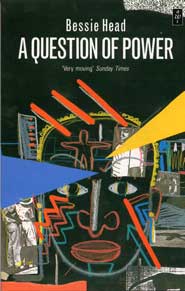 — "Once the record was turned on in her head it just went on and on in the same groove. It was so powerful and insistent that it had the effect of killing the beauty of the living world and trapping her inside its clamour. Her whole nervous system shook under the strain. Painfully, she looked out on the new day. The sun had started its curving pathway across the blue, drought-stricken sky. A small bird in a tree outside her house cockily puffed up his tiny chest and burst into a loud, trilling song.
— "Once the record was turned on in her head it just went on and on in the same groove. It was so powerful and insistent that it had the effect of killing the beauty of the living world and trapping her inside its clamour. Her whole nervous system shook under the strain. Painfully, she looked out on the new day. The sun had started its curving pathway across the blue, drought-stricken sky. A small bird in a tree outside her house cockily puffed up his tiny chest and burst into a loud, trilling song.
'People aren't like that,' she countered, helplessly, muttering aloud to herself. 'They get up and work. They lose their thoughts in inventing things and battling with the problems of life. It's not like this, a ruthless concentration on the obscene.'
It did not help. The record churned on monotonously the whole day, and the day passed in a blur of pain" (116).
§ Some responses to this year's Attention Span — John Latta, 12 September. Ron Silliman, 14 September (and see David Buuck's comment of 17 September). John Latta, 18 September. Tom Orange, 20 September.
21 September 2006 — permalink
§ Screen Memories — Le Fantôme d'Henri Langlois (dir. Jacques Richard, 2004; 128min US cut). • Easter Parade (dir. Charles Waters, 1948). • The Station Agent (dir. Thomas McCarthy, 2003).
§ I'm Against It — Moistworks featured Groucho Marx's great ode to negativity (from Horse Feathers) a few days ago. Hurry have a listen before it disappears.
§ UMaine New Writing Series — Lineup. Blog.
§ Works received — Scary great stuff arriving in the mail lately, including Notley's Grave of Light, Waldrop's Curves to the Apple, Bouchard's The Filaments, Degentesh's The Anger Scale, Moriarty's Ultravioleta.
§ Also reading — Since forever ago (early summer), Gravity's Rainbow. Not likely to finish in 2006 at this pace. • Bessie Head's astonishing A Question of Power (published in Heinemann's African Writers Series in 1974). • Jameson on Zizek (recent LRB). • Menand on Dylan (recent New Yorker). • The excerpts from Sontag's diaries in the NTY Magazine a few Sundays ago. • Goethe's Elective Affinities, which I finally read in mid-August (after a false start in 1994), and Benjamin's early treatise on same. • Eliza Griswold's piece on the "American Gulag" in Harper's. • Some articles and book chapters on conversational prosody, acoustical features of vowels and consonants, and phonatory settings. • And did I ever mention the wonderfully thought-provoking Sonic Experience: A Guide to Everyday Sounds, the English translation of which recently came out from McGill-Queen's UP? I guess I did, obliquely.
19 September 2006 — permalink
§ Attention Span — There are forty-six contributions in this year's installment of Attention Span. Many thanks to (in order received): Meredith Quartermain, Jed Rasula, John Hyland, John Tranter, Brian Lucas, Steve Benson, Annie Finch, Stephen Cope, Leonard Schwartz, James Wagner, Bill Berkson, Catherine Taylor, Marjorie Perloff, Michael Scharf, Anne Boyer, Laura Carter, Pam Brown, Nancy Kuhl, Benjamin Friedlander, Rodney Koeneke, Graham Foust, John Palattella, Joanna Fuhrman, David Dowker, Peter Quartermain, Jeff Hamilton, Mark Scroggins, John Latta, Marcella Durand, Noah Eli Gordon, Fred Wah, G.C. Waldrep, Tony Tost, Michael Nicoloff, Dana Ward, Peter Gizzi, Kevin Killian, Joseph Mosconi, Jennifer Scappettone, Franklin Bruno, John Sakkis, Gary Sullivan, Rod Smith, Tom Orange, Sharon Mesmer, and Joshua Clover.
§Screen memories — Judy Garland: By Myself (dir. Susan Lacy, 2004), part of the American Masters series.
2 September 2006, updated 6 September — permalink
§ Attention Span 2006, update — Pam Brown, Nancy Kuhl, Benjamin Friedlander, and Rodney Koeneke have sent in contributions since I last mentioned this project. And other kind souls appear to be hard at it as well. The deadline's still a nearly infinite number of days away—namely, next Friday. Won't you pitch in?
§ Listening notes — Just discovered Tilar Mazzeo's well-conceived and cleanly-constructed Poets on Poets project, in which contemporary writers select and read aloud poems from the Romantic period. Worth a visit.
§ Screen memories — In John Ford's telling of it, Lincoln employs chance operations to choose his career in law, enjoys improvising on his mouth harp, is not above cheating to win when outmatched (the tug of war, not the trial), and more or less spends his young adulthood preparing to be a statue. I didn't at first accept Fonda's delivery of one-word lines like "Books" (reverent, desirous, clumsy) and "law" (ain't that sumptin), but the Bresson-like cut to Ann Rutledge's gravestone (site of the chance operation) reduced my mirthful superiority but quick. • Out popped the dvd-tray holding Visconti's Morte a Venezia (1971) after just thirty-five minutes, in which brief span no shortage of crimes against Mann's story, which I belatedly read for the first time a few days ago, and of course admired, were committed. I name only: the kissing of the overlarge photographs of daughter and wife (cartoonish avowal of heterosexuality); the interpolated scene of collapse, and the doctor's ominous diagnosis, shown in flashback, which totally and to my mind unacceptably alters the nature of the "death" Aschenbach undergoes; Bogarde's look of panic when "ideas" were launched at him by spasmodic interlocutors at piano keyboards; and the overly-conspicuous use of refocusing (I didn't mind being walked back from a tight shot on Tadzio until I could see the expanse of waiting area separating him from Aschenbach, but a zoom a few minutes later, leading to that panicked face I've already mentioned, did me in).
§ Miscellany — Bernie Worrell (below) profiled and in conversation with Matt Rogers in the August / September issue of waxpoetics, devoted to all things P-Funk. Commenting on a track: "That's Boogie on bass. Hear the difference? He's an Air sign. Billy'd be more in the rock, funk, heavy; that heroin tempo. This here is the cocaine tempo. We were doing the coke—Parliament. Funkadelic was more heroin." • On Saturday, a friend recommends that I read David Foster Wallace on tennis, on Sunday the New York Times Magazine makes it easy for me to do so. I've taken my DFW sparingly, and at longish intervals, and I'm glad, since it leaves me fresh to enjoy this piece on Federer, with its intricate and apt descriptions of the dynamics and tactical decisions that go into an especially good exchange between top-level players. I forgive the one totally gratuitous sentence, perhaps required by an editor, and set aside the misgivings the genre (paeans to top athletes) awakes in me, in recommending it, especially to those who play a little.
24 August 2006 — permalink
§ Lipstick of Noise — After a month's layoff, as flummoxed as ever by the task of saying what I hear, this time in an excerpt from Lisa Robertson's The Men.
18 August 2006 — permalink
§ Attention Span 2006 — If you're a frequent visitor to Third Factory, I hope you will consider contributing to this year's installment of Attention Span. Details on how to participate can be found here. Contributors to date include: Meredith Quartermain, Jed Rasula, John Hyland, John Tranter, Brian Lucas, Steve Benson, Annie Finch, Stephen Cope, Leonard Schwartz, James Wagner, Bill Berkson, Catherine Taylor, Marjorie Perloff, Michael Scharf, Anne Boyer, and Laura Carter.
§ Screen Memories — Kadosh (dir. Amos Gitai, 1999; feat. Meital Barda as Malka). • Robinson Crusoe (dir. Luis Buñuel, 1954; feat. Dan O'Herlihy in title role). • The Gleaners & I (dir. Agnes Varda, 2000). • Secrets and Lies (dir. Mike Leigh, 1996; feat. Brenda Blethyn as Cynthia). • Pickpocket (dir. Robert Bresson, 1959; feat. Marika Green as Jeanne; Kassagi as the mentor-thief; Jean Pélégri as the inspector; with a brief but great deathbed scene by Dolly Scal). • Manhattan (dir. Woody Allen, 1979; feat. Meryl Streep). • One True Thing (dir. Carl Franklin, 1998; feat. Meryl Streep). • The Devil Wears Prada (dir. David Frankel, 2006). • Diary of a Country Priest (dir. Robert Bresson, 1951).
14 August 2006 — permalink
§ To Frighten the Fish — Engaged in the kind of tedious work that lays claim to hands and eyes but leaves the ears free, I recently listened again to the Folkways recording of Cage's Indeterminacy. (Followed by the wonderful conversation Cage and Morton Feldman recorded for WBAI in 1967, but that's another story.) For some reason it's the observation attributed to Kwang-tse that keeps coming to mind, the one about a beautiful woman, "who gives pleasure to men," serving "only to frighten the fish when she jumps in the water."
§ Gommage — "The erasure effect refers to one or several sound elements in an audible ensemble that are deleted from perception or memory. This selective suppression is a fundamental effect of hearing. The majority of audible sounds in a day are heard without being listened to and are then forgotten" (Sonic Experience: A Guide to Everyday Sounds).
§ Shade Trees — "...the lambent mind / surrenders to an existence essentially personal / made up of small electric parts / displaced by the clear bodies of primal opposites / overlooking a shallow pond / and shade trees / derived from the words hate and greed" ("For Your Astral Pleasure," from Watchword by William Fuller).
9 July 2006 — permalink
§ By ear alone — A still photograph of a face: does it feel incomplete for being so silent? A voice in isolation: instills desire to see its source? Bresson on one of his "models": "His voice draws for me his mouth, his eyes, his face, makes for me his complete portrait, outer and inner, better than if he were in front of me. The best deciphering got by the ear alone." And later: "Voice and face. They have formed together and have grown used to one another."
§ Of Late on Lipstick of Noise — Jackson Mac Low, Feeling Down, Clementi Felt Imposed Upon From Every Direction. • Rosmarie Waldrop, Shorter American Memory of the Declaration of Independence. • George Oppen, From a Phrase of Simone Weil's and Some Words of Hegel's. • Fanny Howe, Basic Science.
§ Screen memories — Lancelot du Lac (dir. Robert Bresson, 1974). • E.T. (dir. Steven Spielberg, 1984). • The Sound of Music (dir. Robert Wise, 1965). • The Fisher King (dir. Terry Gilliiam, 1991). • The Black Stallion (dir. Carroll Ballard, 1979).
8 July 2006 — permalink
§ School of patience — "When in regard to communicating something it is self-evident what to communicate means, when it is simply a matter of course and not a moment need be wasted discussing the question, when it is the kind of assumption which does not even need to be mentioned: then, if one has something communicate, it is as easy as shelling peas. But when an author has an individual conception of what communication is, when perhaps the distinctive characteristic, the reality of his historical importance is concentrated in precisely that; well, then it will be a long affair" (Kierkegaard, journal entry of 20 November 1847).
2 July 2006 — permalink
§ Those faces — "The assent to hit songs and debased cultural goods belongs to the same complex of symptoms as do those faces of which one no longer knows whether the film has alienated them from reality or reality has alienated them from the film, as they wrench open a great formless mouth with shining teeth in a voracious smile, while the tired eyes are wretched and lost above" (Adorno, "On the Fetish Character in Music and the Regression of Listening," 1938).
§ White, Clear — K. Silem Mohammad wrote "White" Thursday night; Anne Boyer wrote "Clear" Friday morning. They met up at a machine for some banter, recitation, and self-advertisement shortly thereafter. You can hear it all here.
1 July 2006 — permalink
§ Endless apprenticeship — "By things cadaverable you may expect strange accidents" (OED, citation from 1651). • Maculature [macula, spot]: blotting or waste papers (1656, 1706, 1721). To do: determine precise ratio between literature and maculature for a given writer, movement, epoch.
§ Neutral, Bloomsday — "It was now for more than the middle span of our allotted years that he had passed through the thousand vicissitudes of existence and, being of a wary ascendancy and self a man of a rare forecast, he had enjoined his heart to repress all motions of a rising choler and, by intercepting them with the readiest precaution, foster within his breast that plenitude of sufferance which base minds jeer at, rash judgers scorn and all find tolerable and but tolerable" ("Oxen of the Sun," Vintage edition of 1961, 407).
§ Nonidentifying information — Midway through Ann Fessler's The Girls Who Went Away: The Hidden History of Women Who Surrendered Children for Adoption in the Decades Before Roe v. Wade, it seems that the "seduced and abandoned" narrative (late 19th- and early 20th-century religious sentimentalism) was less damaging than the one in which "feebleminded," failing which "delinquent," failing which "neurotic," would be applied to you by social-work "professionals." • "While their religious predecessors had generally attributed out-of-wedlock pregnancy to the social circumstances of the women's lives and to outside social forces, the new breed of social worker focused on the women themselves. Over many years, they posited a number of theories about why single women became pregnant, all of which were predicated on the problems inherent in the women themselves" (144).
§ Screen memories — Transamerica (dir. Duncan Tucker, 2005; ft. Felicity Huffman). The Constant Gardener (dir. Fernando Meirelles, 2005; ft. Rachel Weisz). United 93 (dir. Paul Greengrass, 2006).
20 June 2006 — permalink
§ Neutral — Sad to have arrived so quickly at the last lecture in Roland Barthes's final course, conducted on Saturdays between 18 February and 3 June, 1978, and devoted to the figure of "the neutral." No desire to quote from it just now (abstention from synecdoche), only to note the pleasure it has afforded me these past two weeks, both in itself (the tone, the manner of inhabiting knowledge), and as a spur to reading and thinking about some of the texts cited along the way (Lao-tzu, Rousseau, De Quincey-Baudelaire-Benjamin, Gide, Blanchot, Barthes' own earlier texts). I haven't begun to make use of the sound files so miraculously available on Ubuweb, but I mean to.
§ Bloomsday Eve — "And Bloom letting on to be awfully deeply interested in nothing, a spider's web in the corner behind the barrel, and the citizen scowling after him and the old dog at his feet looking up to know who to bite and when" (Vintage edition, reset and corrected 1961, p.324).
§ Site Notes — New works received include Rodney Koeneke's Musee Mechanique, Rosmarie & Keith Waldrop's translation of Jacques Roubaud's even-more-than-typically-untranslatable The Form of a City Changes Faster, Alas, than the Human Heart, and the fourth issue of (the friendly, not nice) Modern Review. • Signed lists up on Attention Span now include Janet Holmes, Robin Brox, Dana Ward, Tony Tost, Laura Carter, Joanna Fuhrman. • At Lipstick of Noise, Gertrude Stein, Nicole Brossard, Julie Patton, Lydia Davis, and Charles Bernstein.
15 June 2006 — permalink
§ Nowhere to be found — "When a foolish man hears of the Tao, / he laughs out loud. / If he didn't laugh, it wouldn't be the Tao" (Tao Te Ching 41, in Stephen Mitchell's translation).
7 June 2006 — permalink
§ Wide Open — "How many times, in our lives, do we have to deal with 'frank' people (that's to say, who show off being so): in general, that precedes a small 'attack': one clears onself (in a tactless way) of one's own tactlessness; but the worst about frankness is that in general it is an open door, and wide open, onto stupidity. To me, it seems difficult to have the proposition 'I will be frank' followed by anything else but a stupid statement" (Roland Barthes, "Silence," The Neutral, trans. Krauss & Hollier, 25).
4 June 2006 — permalink
§ Playing favorites — Summer, the season of uncoerced reading, is only about a week old, but I already have some favorites: bound book of poetry, Meteoric Flowers by Elizabeth Willis; chapbook, Seniors by George Stanley; serial epistolary work of poetics (unbound): the Gazette de la Villa Harris (Nºs 1-20) by Emmanuel Hocquard with Juliette Valéry; short story in the New Yorker, Alice Munro's "Dimension" (5 June 2006 issue); blog, A Tonalist Notes (esp. Laura Moriarty's pitch perfect entries), though posts like this one necessitate a mention of Odalisqued as well; book review (of a book I feel indifferent about), "Extended Play" by John Palattella (favorite moment: "Publishing these works isn’t wrong. But it is weird..."). More or less abstaining from film at the moment, but I did watch Munich on dvd a while back with a lively admiration for the acting, costuming, sound engineering, and much of the script: not a favorite, but it's been so long since I saw a movie that didn't suck, let it stand in for one.
§ Death and the New York School — Thus concludes my none too subtle theme this week at Lipstick of Noise, following a train of thought from Brainard to Berrigan to O'Hara.
2 June 2006 — permalink
§ Good enough — "When an organism or blend is entirely good enough for the purposes at hand, relative to other organisms or blends, it is not additionally required to be the best one possible. Evolution does not look through all possible worlds; it selects only from what has come up. In the same way, conceptual integration employs whatever happens to have been activated in individual brains and collections of brains, rather than reviewing everything that could have been activated. In blending, as in evolution, good enough is good enough" (The Way We Think 321-22). This, believe it or not, is a pep talk.
§ Lipstick of Noise — Cumulative track list, in reverse order, or alphabetized, here. Get fed here.
1 June 2006 — permalink
§ Endless apprenticeship (the one to language) — Queclarative: prosodically a question, grammatically a declarative statement (Geluykens); or, a question used as an opposite assertion, e.g. "does anyone still wear a... hat? I'll drink to that...." (Sadler, Wennerstrom, example courtesy Stritch/Sondheim). • Whimperative: imperative phrased as an interrogative ("why not drop the bullshit?"). • Obnunciate: to tell ill news.
§ Running the blend — X is "pungent," "like eating cabbage in a dark alley by the back door of a jazz club" (Clive Bell); X "scuttles around like an amplified scarab beetle, pushing its way deep inside the cracks of the listener's skull to lay eggs that will hatch nightmares within the subconscious" (Edwin Pouncey); listening to X "can sometimes feel like being dragged backwards through mud" (John Gill); X "zooms in on the sonic undergrowth like a wildlife cameraman marvelling over a teeming ants' nest" (Derek Walmsley). (All from The Wire 267, "Soundcheck," A to I.)
§ Binary — Volume three of Roland Barthes's Essais critiques, in which I was the other day reading, for the first time, an interesting essay on the act of listening ("Écoute"), bears the title L'obvie et l'obtus. "Est-ce tout? Non," as he says in "Le Troisième Sens." But nearly.
§ Surrogate speech acts — I know several people, men, not especially young, whose discourse is as dependent upon prefab syntagms lifted from film and television as an emphysema patient is upon his or her oxygen tank. Click, click, click, click.... • Disanalogy: the oxygen is a constant, whereas the "samples" change according to the media release cycle (otherwise we'd be discussing the devotée, the diehard fan, etc.). • Project: determine archeo(media)logical provenance of all such syntagms in such a speaker's repertoire at a given time, describe the contextual circumstances that "prompt for" recitation, observe response of interlocutors (by analogy to the concepts of "tone concord" and "concord breaking" in prosodic analyses of conversation, perhaps classify responses as exhibiting "clone concord" or "clone breaking"?).
§ Binary (bis) — There are not, I know, two kinds of music. It'd be stupid to say so. But I notice that certain compositions contribute to my aural environment, whereas others seek to substitute themselves for it. Oliveros, Cage, Feldman, are donors. Callas, even just rehearsing, can't help but usurp (not that one isn't grateful). Ditto Lil' Flip. My binary, then, in infinitives: to supplement vs. to supplant. An extension: assuming that much so-called popular music means to make thinking impossible (cognitive jamming), can there be a counterpart that induces and contributes to thinking? Without being merely smart? Not: do my thinking for me. But: I've been doing my thinking, and I wonder what you might have to add.
31 May 2006 - permalink
§ Site notes — Newly added to Attention Span, David Dowker, Jeff Hamilton, K. Silem Mohammad, Franklin Bruno, Joseph Mosconi, and David Hess. • On Lipstick of Noise, Ernst Jandl and Joe Brainard. • And new additions to the works received, including Bay Poetics, Traffic 1, and a new chapbook by Philip Jenks.
§ Screen memories — Working on someone else's dream, a scene from Mulholland Drive came to mind: the one in which that ultra-expressive female vocalist, who has the protagonists dark and light in tears, keels over, and the song, now sourceless, continues on.
30 May 2006 - permalink
§ Site notes — Seems all I ever do is post site notes here lately. This one is "just to say" that thanks to Jerrold Shiroma at duration an XML-version of Lipstick of Noise is now available. No need to change links if you are content with the feedless html version: I'll update both. Most recent additions you ask? Bernadette Mayer's translation of Catullus XLII and DJ Spooky's mix of Baraka's "Black Dada Nihilismus."
24 May 2006 - permalink
§ Site notes — Lately on Lipstick of Noise, bpNichol, Kit Robinson, Kenneth Goldsmith, Mei-mei Berssenbrugge, Paul Dutton, and Rae Armantrout. • Meanwhile, at Attention Span, signed lists by John Palattella, Marcella Durand, Crag Hill, Gary Sullivan, Michael Scharf, John Sakkis, Noah Eli Gordon, and Benjamin Friedlander.
19 May 2006 - Permalink
13 May — permalink
§ Site notes — The last month or more of works received finally documented. • On Lipstick of Noise, listening to Brenda Coultas. • Recent additions to Attention Span include Crag Hill, Marcella Durand, John Palattella, and Kevin Killian.
§ Screen memories — Imitation of Life (dir. John M. Stahl, 1934; feat. Louise Beavers, Claudette Colbert). Hadn't known the famous Sirk was a remake. • Also in TCM's focus on race and Hollywood, The Littlest Rebel (dir. David Butler, 1935; feat. Bill Robinson, Willie Best as James Henry, Shirley Temple). • Wish I'd skipped the lamentable exercise in auto-plagiarism that is Match Point (dir. Woody Allen, 2005).
1 May — permalink
§ Site note — Very slowly, very belatedly, very admiringly, adding, at the rate of one or two a day, the signed lists and commentaries to Attention Span.
§ Un privé à Bangor - And the case of the crystal stropper.
29 March — permalink
§ Comment vivre ensemble — After spending a few days in southern California visiting my sister and my best friend, coming home to host Fred Wah's visit to Orono, then dashing to Boston to meet Anna and listen to Jen's reading with Dorothea Lasky, I can hardly remember there's such a thing as the internet, let alone my duty to whisper into it now and again. To hold a place, three photos: Jennifer Moxley with Derek Fenner's painting of FO'H after the Union Square gig, Fred Wah reading "Mister In-Between" to the students in my course on hermeneutics, a long view of the staircase wall of Monique van Genderen's current installation in the Hammer Museum's lobby. Happiness, gratitude to be in the company of those who know how to live together and keep things interesting. The rest is work!
12 March — permalink
§ Screen memories — Voyage á Reykjavik (dir. Emmanuel Hocquard & Alexandre Delay, 1994). • 2046 (dir. Kar Wai Wong, 2004). • The Aristocrats (dir. Paul Provenza, 2005; ft. Sarah Silverman, shown below). • Margaret Cho: Assassin (dir. Kerry Asmussen & Konda Mason, 2005). • "Crosseyed and Painless" and "Once in a Lifetime" by Talking Heads (Rockpop German TV Appearance, 1980, included on reissue of Remain in Light).
11 March — permalink
§ Lipstick of Noise — Of late: Roger Pellett, Tracie Morris. And encouraging words from unexpected quarters. Thanks, he said, to Sean of the gramophone!
§ Videosphere (disambiguate) — Did some gleaning in the fields of amateur (and old and offbeat) video. Came across "2+2=5," with bees, without. "Sister, I'm a Poet." And the execution of Mussolini. Not to mention lots of dv karaoke, a fair number of pranks and pratfalls, and untold stores of lo-tech exhibitionism of every stripe. More interesting than the dvds I might have rented at the strip mall, but not much isn't.
8 March — permalink
§ The Trades — Read this letter to the editor in the TLS last night re: the arms trade and the book trade. Dimming mind took a moment to remember that Reed Elsevier also owns Publishers Weekly, for which I and others have sometimes churned out words. Interesting.
§ Lipstick of Noise — Still trying. Of late: Padgett, Guest, Nakayasu, Sullivan, and Willis. But due to chronic witlessness on my part still no rss feed and no comments. Serve yourself!
§ Site Notes — The index page has been simplified, the works received has been updated, and a few new squibs have been added to Lipstick of Noise.
Late February — permalink
§ Screen memories — Les Enfants du Paradis (dir. Marcel Carné, 1946; wr. Jacques Prévert; feat. Arletty, Pierre Brasseur as Lemaître, Marcel Herrand as Lacenaire). • The Facts of Life (dir. Melvin Frank, 1960; feat. Lucille Ball, Bob Hope). • The Upside of Anger (dir. Mike Binder, 2005; feat. Joan Allen). • Less Than Zero (dir. Marek Kanievska, 1987). • Being Julia (dir. István Szabó, 2004; feat. Annette Benning).
§ Rank — "Wherever there is rank and promotion the way lies open for wishes that call for suppression" (Freud, Intepretation of Dreams).
§ Screen memories — Broken Flowers (dir. Jim Jarmusch, 2005; feat. Jeffrey Wright as Winston, Tilda Swinton as Penny). • Notre Musique (dir. Jean-Luc Godard, 2004). • The Life Aquatic with Steve Zissou (dir. Wes Anderson, 2004; feat. Angelica Huston). • Last Days (dir. Gus van Sant, 2005). • Me and You and Everyone We Know (dir. Miranda July, 2005; feat. Miles Thompson and Brandon Ratcliff as Peter and Robert Swersey). • Garden State (dir. Zach Braff, 2004; feat. Peter Sarsgaard as Mark, Natalia Portman as Sam, Method Man as Diego). • The Godard possibly excepted, everyone has had a chance by now to make up his or her mind about these titles (ah, life in the provinces). I'll just note that they were the first films I've had occasion to watch on my laptop with headphones, which as you may know already is an interesting way to do it. The distance between us and the screen just keeps closing.
nb archive
September 2005 - January 2006
March - August 2005
January - February 2005
July - December 2004
March - June 2004
January - February 2004
October - December 2003
September 2003
August 2003
July 16-31, 2003
July 1-15, 2003
June 16-30, 2003
June 1-15, 2003


